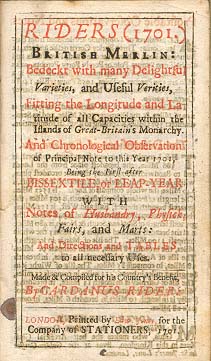Deb Houlding’s Skyscript site has a fascinating history of the astrological almanac written by  Derek Parker, co-writer with his wife Julia of quite a few widely-read astrology books. These almanacs were compendiums of astrological information that was considered useful for physicians and other medical professionals in the early and middle ages, as well as for the general public.
Derek Parker, co-writer with his wife Julia of quite a few widely-read astrology books. These almanacs were compendiums of astrological information that was considered useful for physicians and other medical professionals in the early and middle ages, as well as for the general public.
- In England, the first almanac to be published was probably issued by an Italian, William Parron, in the 1490s, though Wynkyn de Worde, an assistant to the printer Caxton, published one in 1491. Parron worked for a while at the court of Henry VII, but vanished mysteriously just after the Queen died at the age of 37. This may or may not have had something to do with the fact that he had just predicted she would live into her 80s.
- Some almanacs were written by rather odd people… [such as] the Reverend William Bredon, Vicar of Thornhill in Buckinghamshire, who used to cast horoscopes at the altar in order to inform his parishioners as to the whereabouts of stolen horses and cattle, and (William Lilly tells us) was so addicted to smoking that when he had no tobacco he would cut the bell-ropes and smoke them.
- Johannes Kepler, born in 1571, whose studies of the positions of Mars recognised the elliptical motions of the planets around the Sun,… found that one of his duties there [as teacher of mathematics and astronomy] was to publish an annual astronomical almanac…
- Kepler’s almanacs were very successful and, it seems, accurate. In the first one he predicted among other things a spell of very cold weather and an invasion by the Turks [both of which came to pass].
It’s far from my thoughts that there’s any binding or inevitable necessity in what I predict by the radiation of heavenly bodies: the stars have no such unlimited laws – they are bounded, and give light to us, or some small glimpses of the great affairs God intends upon earth; but if we rely on our judgement without relation to the immediate rule of His eternal providence, alas, how soon of wise men we become errant fools and idiots!

